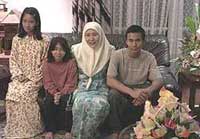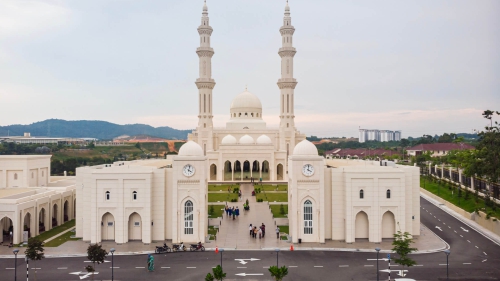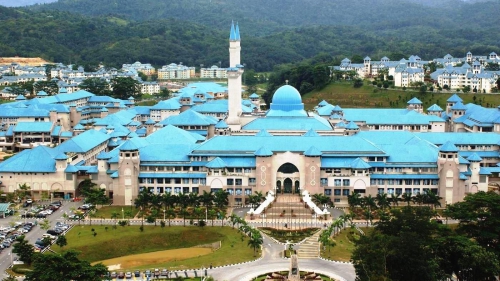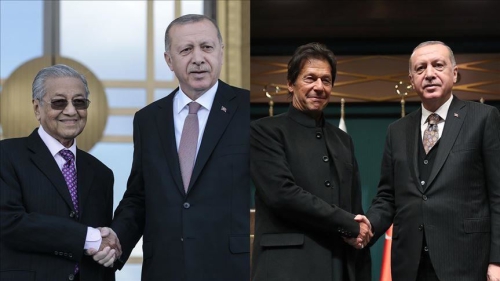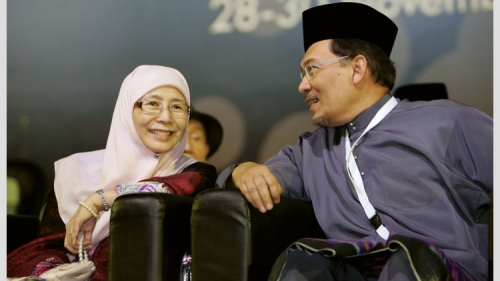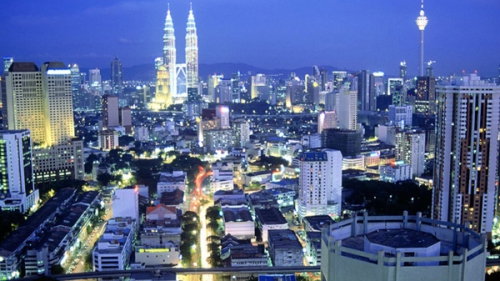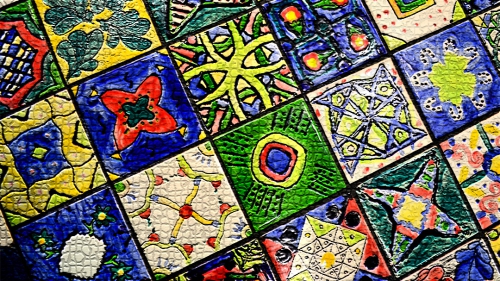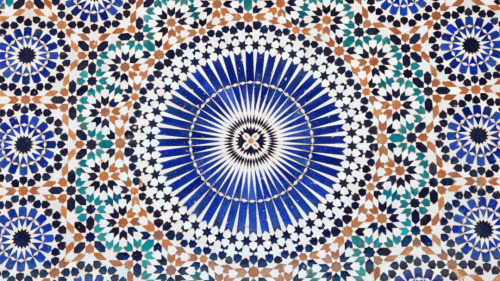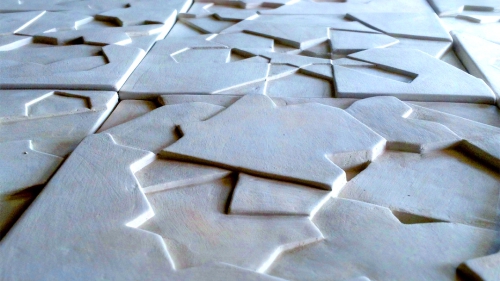Malaysia's Other First Lady: An Interview with Wan Azizah Wan Ismail

The wife of ousted Malaysian deputy premier Anwar Ibrahim and President of the opposition National Justice Party Wan Azizah holds a press conference at her home in Kuala Lumpur 19 April 2001. Azizah accused Malaysia's health minister of slandering her husband's doctor and challenged him to repeat the remarks outside parliament. |
Wan Azizah Wan Ismail, wife of Malaysia's former Deputy Prime Minister Anwar Ibrahim, is perhaps the most unwilling headline-maker in Asia. Thrust into the spotlight after her husband's arrest, she has handled this difficult new role with grace and immeasurable strength. Convinced that the government's campaign against her husband is an attempt to discredit him and end his political career, she has tirelessly worked for his release and for change in Malaysian laws.
Underneath her soft-spoken, mild-mannered demeanor lies nerves of steel as she goes head-to-head with Malaysia's power elite over the alleged abuses of her husband.
Traveling the country to speak to crowds, conducting interviews with both Asian and Western reporters and meeting with foreign diplomats, Wan Azizah has risked imprisonment herself. She has emerged as the symbol of Malaysia's reformasi opposition movement and voice for change in Malaysia.
She is also an elected member of the Permatang Pau in the state of Penang and won the seat by defeating a 10,000 vote margin.
In an interview with iviews.com, Wan Azizah spoke about the political atmosphere in Malaysia and her private life since the arrest of her husband.
In the first of a three-part series, she talks about the personal toll the most recent events have had on her, her children and her husband. The interview was conducted Monday, April 9 2001 at their home in Kuala Lumpur. To watch this portion of the interview, click here. ![]()
|
Background A power struggle between Prime Minister Mahathir and his deputy, Datuk Seri Anwar Ibrahim, had been building for several years, but it intensified as the economic crisis worsened. Anwar increasingly took a pro-free market approach sympathetic to foreign investment and trade liberalization, while Mahathir advocated currency controls and blamed the West and Western currency speculators in particular for his country's economic plight. By mid-year 1998, borrowing the reform slogans from neighboring Indonesia, Anwar's supporters within the ruling United Malays National Organisation (UMNO) party were making corruption and nepotism major political issues, with Mahathir and his associates the unstated target. Chronology of the Anwar Ibrahim case In May 1998, 50 Dalil Kenapa Anwar Tidak Boleh Jadi PM (50 Reasons Why Anwar Cannot Become Prime Minister), a book containing graphic sexual allegations as well as accusations of corruption against Anwar, was published in Kuala Lumpur. In early June, the book was circulated at the annual meeting of UMNO. It was during that meeting that Mahathir apparently began strengthening his control over the party and making moves against Anwar. Days later, Anwar obtained a court injunction to prevent further distribution of the book and filed a defamation complaint against the author. In August, police charged the author of the 50 Reasons book with malicious publishing of false news. But in September, the judge who had banned the book's distribution--a pro-Anwar decision--was transferred, raising concerns among Malaysian lawyers about a judiciary whose independence was already problematic. Key events in the still unfolding crisis are as follows: July 14: Johan Jaaffar, editor-in-chief of Utusan Malaysia, an UMNO-owned newspaper, resigns after political pressure from UMNO leadership. The paper, under Jaaffar's leadership, had focused on the need for political and economic reform. "Whoever replaces Johan should understand the struggle of UMNO--to serve the president of the party," a spokesman for the publisher said. "We cannot have someone with his own agenda." (AFP, July 20, 1998). Another editor, Ahmad Nazri Abdullah, resigns from Berita Harian four days later. August 12: Businessman K.S. Nallakruppan, an Anwar associate, is arrested on a charge of unlawful possession of live ammunition. He is charged under Section 57(1)(b) of the ISA which carries a mandatory death sentence if convicted. Affidavits later filed at the High Court also accused Nallakaruppan of arranging some of Anwar's sexual liaisons and suggested that because they traveled together abroad, Nallakruppan may have had access to official secrets. (Nalla, as he is known, has since accused officials of the Criminal Investigation Department of not allowing him to see his lawyers on September 1 and September 15. His trial on the ISA charges is to be heard on November 9.) September 2: Anwar sacked as deputy prime minister and finance minister September 3: Anwar expelled from UMNO. September 14: Mohamad Ahmad, Anwar's former private secretary, is arrested under Section 117 of the Criminal Procedure Code in connection with police investigations into the book, 50 Reasons. He is later unconditionally released on September 23. September 19: Two close Anwar associates, his former speechwriter, Munawar Anees, 51, and Anwar's adopted brother, Sukma Dermawan, are s,entenced to six months in prison after pleading guilty to engaging in "unnatural sex" and allowing Anwar to sodomize them. They had been arrested on September 14. They later recant their testimonies and appeal their convictions on the grounds that their, guilty pleas were involuntary. The lawyer for Munawar is Balwant Singh Sidhu, who is also the lawyer for Datuk S. Nallkaruppan. September 20: Anwar is arrested at his home by police, after some 35,000 of his supporters marched to demand the prime minister's resignation. Also arrested following the demonstration were six others including UMNO youth leader Zahid Hamidi and several officers of the Malaysia Islamic Youth Organization (Angkatan Belia Islam Malaysia or ABIM). All are detained under Section 73(1) of the ISA. September 29: Anwar appears for the first time in public to be formally charged on five counts each of corruption and "unnatural sex."He has a black eye and a bruised right hand and accuses his captors of beating him on the night of his arrest until he was bloody and half-conscious. The charges involve engaging in carnal intercourse with five people at different times and places between December 1993 and Aprill 1998; interfering with an Anti-Corruption Agency investigation into the activities of his private secretary; and trying to interfere with police interrogation of witnesses to his alleged sodomy. October 5: Kuala Lumpur High Court places gag order on public discussion of Anwar case. October 14: Anwar released from ISA detention after 24 days but remanded to Sungai Baloh prison after his application for bail was rejected on the grounds that there was "a danger of witnesses being tampered with as the charges involved interference with witnesses." ("Anwar released from ISA detention," New Straits Times, October 15, 1998) Four people arrested on September 20 in connection with the Anwar case remain in detention under the ISA: they are Zulkifi Nordin, a lawyer, who was arrested on September 29; Ruslan Kassim, a lawyer and UMNO youth chief for the state of Negeri Sembilan; Abdul Malek Hussein, former executive secretary of the opposition party, PAS; and Haji Shaari Sungit, president of Jemaah Islah Malaysia, who was arrested on October 12. Fourteen others were released. October 28: Sukma Darmawan files habeas corpus petition claiming his conviction and sentencing were unlawful, because as a Muslim, he should have been tried in a Muslim court (the Syariah Subordinate Court). The Kuala Lumpur High Court, meanwhile, dismisses a habeas corpus petition for the release of Anwar Ibrahim. |
iviews: We know that by profession you're an ophthalmologist. Did you ever envision yourself landing where you've landed?
WAI: No. Not like this. I've always been behind the scenes. My priorities have been as a
mother and a wife. You do your work. You con,tribute to society because we are part of society. Allah created us not alone, so you have to live in a real world society of Muslims. I've always liked to be behind th,e scenes. I have always been afraid too much of myself that sometimes if you do things, if you are too much in the public eye, you tend to have to have...pride. You forget everything has to be of Allah.
iviews: Tell us about your family life, how many children you have and what they do.
WAI: I have six children, five daughters and one son, alhumdullilah. Now I go to parliament and I neglect my children quite a bit and they complain a lot. I travel quite a bit now and try to cover the country to keep the issue of Anwar Ibrahim alive. We do not have the media as I said earlier. We have to meet the people and of course we have friends we have an extended family. My children alhumdullilah have someone to take care of them. I have friends who come and help them out. My son is currently in Islamic college... and my eldest daughter...is in university doing...electronics. She has also had problems in university. The other students were told that being friends with her may jeopardize their scholarships. She has had a bit of pressure.
|
|
Wan Azizah Wan Ibrahim poses with her children in their home in Kuala Lumpur 9 April, 2001.
iviews: Are your children angry?
WAI: I think so, especially my son. But I told them you must not have vengeance. It will erode your judgment and it will cloud your mind. Everything Allah does...I'm sure there must be wisdom...everything He does.. you will get reward... The more you are tested, the higher your reward, insha'Allah. My children have channeled their anger into something which I feel is productive and for that we are very grateful. Of course I have all the feelings. We are human, but I wouldn't want to be angry because anger may not give you the right feeling to do things. You must always ask yourself...bow to the Almighty. For me, I feel that I have to submit...It helps you very much. Once you submit, it reduces your anger. It reduces a lot of things. You do your level best. I actually cried when I read the translation... 'sometimes Allah does not reward you in this life.' I was sad. I will never forget that. Allah is merciful.
iviews: Insha' Allah, Allah will reward you and your children...in this temporal world and the eternal Akhirah. When did you visit your husband last?
WAI: Just this evening.
 Jailed Malaysian ex-deputy premier Anwar Ibrahim arrives at the University Hospital in a wheelchair in Kuala Lumpur 03 April 2001. Anwar was allowed to visit his mother when she was gravely ill. |
iviews: How is his health?
WAI: Alhumdullilah, he can pray sitting. Last time he had to pray lying down because of the pain. But he is a bit sad because his mother just passed away. Otherwise, he's all right, alhumdullilah. Now every time we want to leave him...the children and him read dua.
WAI: We have to apply for every visit. So far they've allowed us every alternate day. He's very closely guarded with police outside... Even though they said on national television that he has a TV and a fridge, he doesn't and that's been verified by the prison authorities.
iviews: Now you've been trying to get him out for medical treatment. The treatment hasn't been available here. How successful have you been in this pursuit?
WAI: So far, the government has said they would not allow brother Anwar Ibrahim overseas for treatment, but we will appeal to them on humanitarian grounds because so far, that treatment is not available here. It has risks and it's under local anesthesia and it is minimally invasive considering it's on the spine. It (a normal operation) may damage the spinal cord and give him paralysis and that is the danger and so we are requesting that he be given the chance to have it done in a dedicated spinal center in the Alpha Klinic in Munich, Germany.
iviews: Purely on a humanitarian basis, is there anything Muslim individuals, or Muslim institutions, or Muslim governments can ask the current administration to let Anwar Ibrahim go?
WAI: I think on humanitarian grounds they have every reason to ask that brother Anwar Ibrahim be given the chance to be treated where he chooses. One thing is we will have to bear all costs. After being in custody and being assaulted in custody, brother Anwar...it is kind of difficult for us in this situation but also because of this procedure. It is minimally invasive. It doesn't go through the spinal canal, which in this case in brother Anwar's case, makes the operation technically difficult. It is under local anesthesia, so if the nerve is touched, brother Anwar can himself caution the doctor. So I think on these grounds, Muslims all over the world can appeal, to the government ,to allow brother Anwar to go.
iviews: The process of appeal, can that be done through the local Malaysian consulates in respective cities and through websites?
WAI: Websites would be limited to only certain supporters who go to the web. But if they send postcards to the prime minister or the deputy prime minister, he's also the minister in charge of prisons. Or the health minister, because the health minister has allegedly said that the specialist actually insulted the local doctors, but that is not true. The health minister said brother Anwar should refuse the specialist because it's unpatriotic to be treated by such a doctor who has insulted our local doctors, which is not the case at all. Dr. Hoogland has been given the chance only to see facilities within the oldest hospital in Malaysia...where (parts) were closed for renovations. He wasn't insulting all anesthetists in Malaysia, [he] was just saying that that particular hospital for that particular procedure is not available here.
iviews: What would be your message to Muslims in North America?
WAI: First of all, I'm grateful they are interested in this case, especially brother Anwar is also touched by the level of interest and the concern of [Muslims] all over the world who make dua. [And also who] voice a concern to show to our government. Islam is the main, official religion. This is the way to show support for brother Anwar on humanitarian grounds. Another Muslim is in pain [and they should] allow him to have that treatment. Allah said you will have to seek the best.
iviews: Our dua's are with you and brother Anwar Ibrahim.






